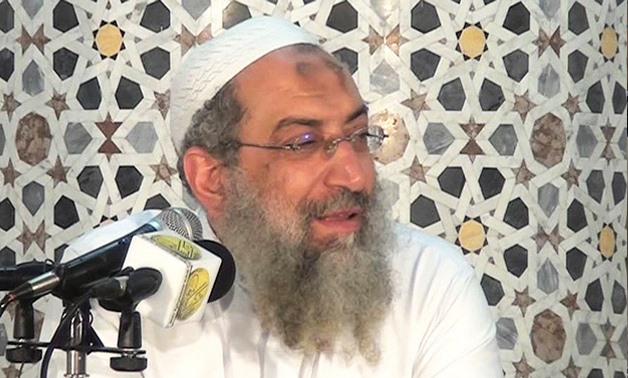
Founder of the Salafist Call Yasser Al Borhami_Archive
CAIRO – 6 May 2017: The Religious Committee of the House of Representatives approved on Thursday a bill regulating, for the first time, the issuing of fatwas (Islamic decisions) in Egypt- a step which could be a blow to the Salafists.
Per the new bill, issuing Fatwas (Islamic decisions) will be limited to only four religious bodies, namely, Fatwa Committee of the Islamic Research Complex, Al-Azhar Senior Scholars Authority, the Administration of Fatwa at Awqaf (Endowment) Ministry, and Dar al-Ifta, which is responsible for the Islamic opinion.
Only those bodies have the right to issue fatwas or give Islamic clergymen licenses to issue fatwas. The crime of violating the law is punishable by a six-month imprisonment and a fine ranging between 5,000 EGP ($276) and 10,000 EGP, according to the draft law. The bill was drafted by consensus heads of the four religious bodies.
The law “will end the arbitrariness of the issuing of fatwas by unauthorized people…it guarantees that correct and authentic fatwas will reach Muslims, to bring an end to unnecessary provocation amongst Muslims,” said Parliamentarian Amr Hamroush, who proposed the law.
“The bill, if passed, should be applied to Salafi preacher Yasser Bouhami due to his controversial fatawa,” a preacher from al-Azhar, Ahmed al-Bahi, said on Saturday. Bourhami is a physician not a preacher, he added. “The Salafis are the biggest losers by this law,” Bahi said.
In April 2014, Bourhami issued a fatwa that Easter is Christendom’s most “unfaithful feast”.He also released another fatwa stating that a man is entitled to leave his wife to rapists if he is sure that they would rape her even after killing him, so that he would be able to run away and save his life.
However, the bill was labeled “ambiguous” by the Salafi preacher Sameh Abdel Hamid on his Facebook page on Friday, saying that the law does not differentiate between the fatwa and the discretion on passing religious judgment.

Comments
Leave a Comment